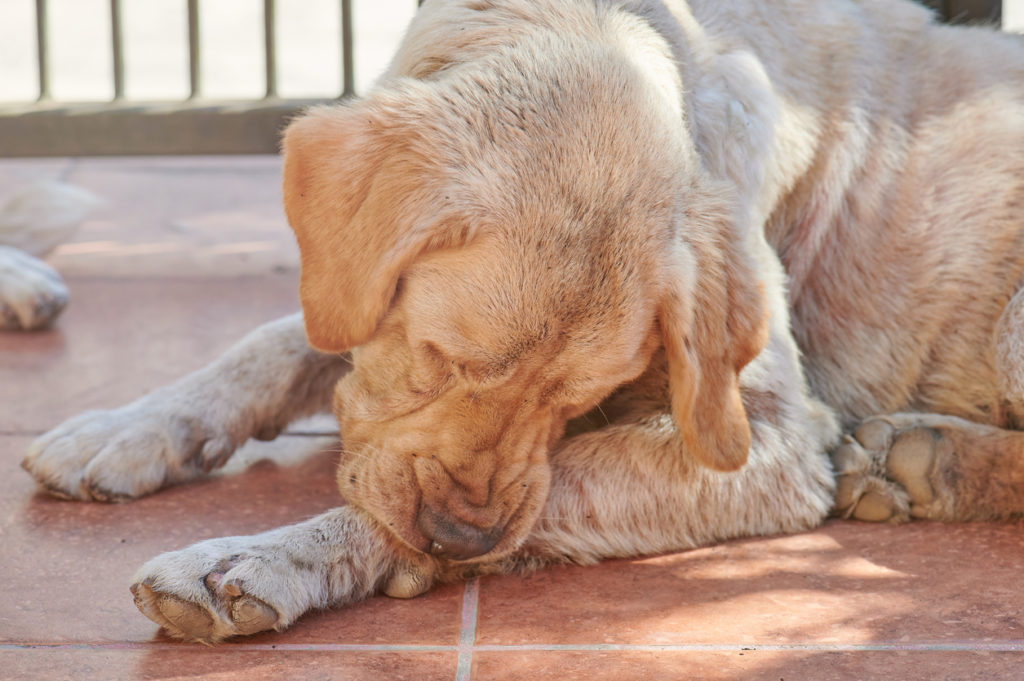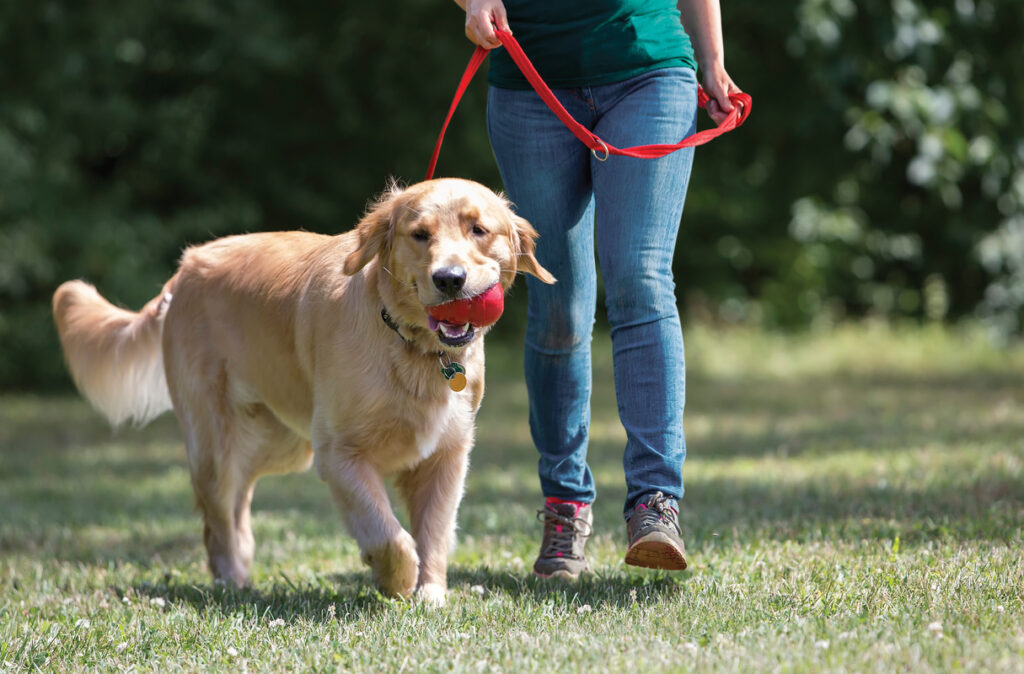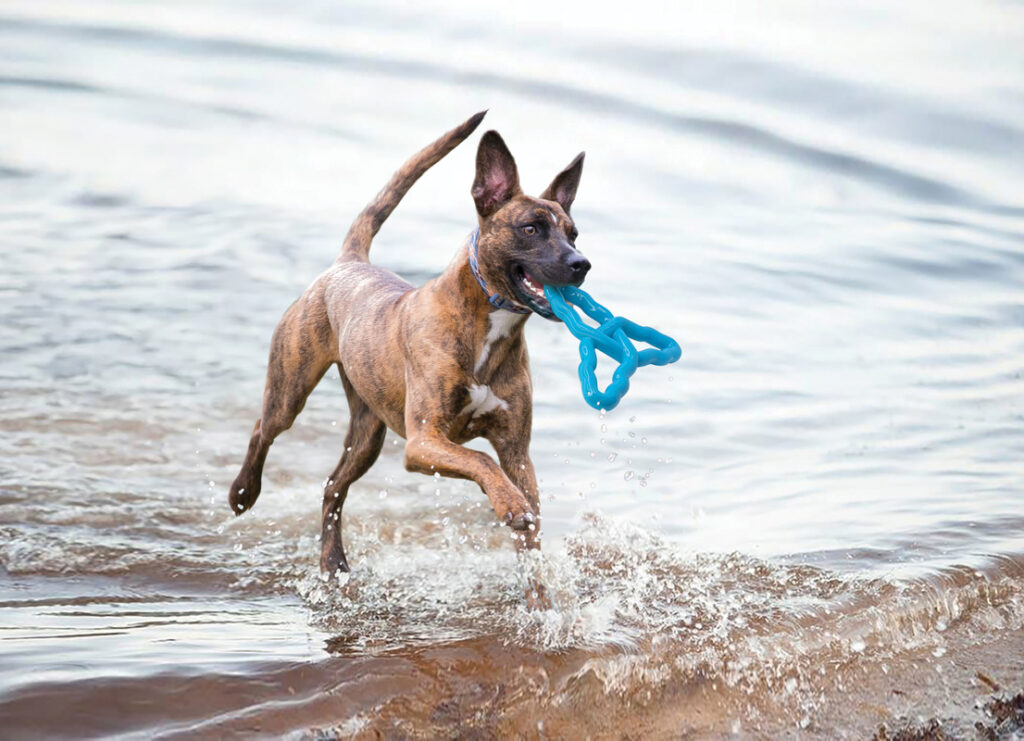Dogs’ paws are absolutely adorable. Ask any dog owner past, present, or future, and they are sure to give you the same answer. You could even ask anyone on one of the nearly countless dog-obsessed groups online.
In fact, many of those groups are specifically dedicated to dogs’ paws. We think of those adorable paws as super sturdy. After all, not many dogs wear shoes. However, these paws can be more fragile than some would assume. As such, it is important to keep an eye out if their behavior toward their paws seems out of the ordinary.
If you are used to witnessing your dog occasionally groom their paws but largely leave them alone, it might seem jarring if they suddenly begin to pay much more attention to them. Understandably, this could serve as somewhat of a cause for alarm for concerned pet parents. Remember during this time that a dog licking and chewing their paws could come from a whole host of different causes and signify many possibilities.
A dog who enjoys regularly licking and chewing on their paws could mean any number of things. For one, it is possible that this habit means absolutely nothing.
On the other hand, it is also a possibility that your dog’s behavior could be an indicator of a health concern. So, before you determine exactly what is causing your dog to lick and chew at their paws so frequently, you need to ask a few integral questions.
Let’s discuss what to look for and how to help our furry friends.
Is It Normal for a Dog To Lick and Chew Their Paws?
The answer is that yes, it can be perfectly normal and expected for dogs to lick and chew their pads. That being said, this behavior can become abnormal and a cause for concern if it becomes overly frequent.
As pet parents, it’s a joy for us to watch our pets go about their daily lives. Luckily, this helps our pets too. Watching our pets helps ensure they are hydrated, mentally stimulated, and are healthy overall.
It is only by knowing their average rituals when they are feeling perfectly healthy that you can best identify any and all changes. By being attentive and aware of how your dog acts regularly, you will know that your questions regarding their new state are warranted.
This way, you will also be much better equipped to give a thorough background of your dog’s medical history, which can be immensely helpful for their veterinarian.
What Should You Look Out for When Your Dog Is Licking and Chewing Their Paws?
Since it is entirely possible for licking and chewing of the paws to be an unremarkable behavior for dogs, you should know when to start to feel concerned.
To start, be sure to consider if this is something new that your dog has just recently picked up or if they have always done this.
Secondly, it is helpful to pay attention to the frequency with which your dog licks their paws. If your pet has started chewing on them significantly more than they used to, that could also be a cause for concern.
Another indicator of something possibly being wrong with your dog’s paws is if they pay much more attention to one than the other. Also, if you hear your dog whining or making other noises while dealing with their paws, that could mean they are experiencing some pain or discomfort.
Is This a New Behavior?
Just to review, if your dog regularly grooms themself, it is possible that this is simply how your dog likes to operate. That being said, it is also possible that more frequent attention to the paws is the result of a chronic issue that should be addressed.
Grab a notebook and start keeping track of these changes; this will be super helpful information for your veterinarian if you need to ask for professional advice.
If your dog has only just now started licking and chewing their paws, it might seem more straightforward that something is amiss. Now, you must determine where the motivation behind this new behavior lies. This evidence will be key in improving your dog’s day-to-day life.
Grooming
The first possibility of why your dog is licking and chewing their paws is quite a simple one. Dogs (and cats) groom themselves to keep themselves clean.
A Self-Soothing Mechanism
If your dog is experiencing stress, you might notice them licking their paws. This behavior can be calming, so just try to identify the source of the stress and remove it if possible.
It is also possible that your dog is licking their paws out of boredom. If this is the case, look for dog toys that offer mental stimulation, like interactive and treat dispensing toys. An occupied dog is a happy dog.
Experiencing Allergies
It’s not just us humans who are prone to experiencing allergies. In reality, allergies can bother a wide range of the animal kingdom.
Animals can absolutely have allergies, and this includes dogs. Like humans, a dog’s allergies are caused by the immune system going haywire when exposed to certain allergens.
There is no special reason that one dog might be allergic to something while other dogs have no issue with it. Some pet parents worry that they somehow caused their dog to have this allergy, but that is not true.
Instead, whether or not your dog has allergies is really just the luck of the draw. Dogs can develop an allergy or food intolerance at any age throughout their lives, but the first reaction is typically seen between the ages of one and five.
While your actions do not have any sway on your dog’s potential allergies, their genetics play a substantial role. As a result, there are certain dog breeds that are particularly likely to experience allergic reactions. For instance, Labrador Retrievers, English Bulldogs, Pit Bulls, West Highland White Terriers, Golden Retrievers, and French Bulldogs are all prone to having allergies.
There are also certain allergens that are more likely to cause a reaction. Here are some of the most common contenders:
Pollen and Grass
While pollen and grass are likely unavoidable on most walks with your dog, they can still cause allergies to flare up. Since your dog’s paws will often touch the grass, any allergies relating to that natural material are likely to manifest there.
Dust and Storage Mites
Even if the allergen that your dog comes into contact with does not touch their paws specifically, it is still possible that they will experience symptoms in that area.
In fact, itchy paws are one of the most common signs of allergies in dogs. If your home is dusty or could use a clean, your dog may have some discomfort as a result.
Mold
Breathing in mold is bad for anyone of any species, but it can also cause allergy symptoms to flare up in your dog. If they are suddenly licking and chewing at their paws much more than they did previously, it might be time to give your home a deep cleaning. Some mold types may require professional removal services.
However, it is important to note that many mold allergies are ubiquitous, meaning that they can exist both indoors and outdoors. So, it could be prudent to have a professional give your home and backyard a thorough inspection.
Household Cleaners or Detergents
While a deep cleaning can be beneficial for many different sources of dog allergies, make sure that the cleaner you are using is not the culprit.
It is possible that whatever detergent or household cleaner you use is causing discomfort. If you recently switched over to a new cleaner or formula, it might be time to switch back.
Their Food
Since so many of the common human allergens are found within the food that we eat, it is natural to assume that this might be the case for dogs as well. In reality, however, only between 10% and 20% of dogs with allergies are allergic to something in their food.
The vast majority of the time, something else is the issue. If food appears to be the issue, you will need to perform a food test. Your vet may recommend a limited ingredient diet to try to isolate which food is upsetting your pup (the protein source is most often to blame).
A Skin Infection
Other than allergies, the cause of your dog’s itchy paws may be a skin infection. Skin that has become infected may become red, swollen, warm to the touch, and may have brown or yellow discharge.
Bacteria and yeast will gladly multiply with help from the warmth and moisture of your dog’s licking and chewing. All of that licking and chewing opens up more holes in your dog’s skin barrier, allowing bacteria and yeast under the surface. Once under the skin, bacteria and yeast flourish and cause even more itchiness, redness, and discomfort.
Nails and Pads
Taking a quick look at your dog’s nails can be very enlightening. If their nails or paw pads appear inflamed or ingrown, that is something that could cause a lot of discomfort. Cutting your pet’s nails is a critical aspect of pet health. Additionally, you should be regularly checking their paw pads for inflammation or foreign objects.
Fungus Can Cause Itchiness
Fungus such as ringworm often cause discomfort and itchiness that centers around your dog’s paws. If you suspect your dog may have come in contact with such a fungus, it’s time to call your vet faster than a Golden Retriever chasing a tennis ball. (Keep in mind that ringworm is not actually a worm at all.)
Pet Care without a Pause
If you have determined that your dog is licking their paws too often to be normal, it is likely time to ring your vet.
This is where the licensed veterinarians at AskVet can help. Download the KONG Club app to reach out to the AskVet team, available 24/7. For all your pet-related questions, our team of vets, animal behaviorists, and animal nutritionists are only a click away, so your pet can get whatever they need whenever they need it.
Sources:
Long-Term Stress Levels Are Synchronized in Dogs and Their Owners | Scientific Reports
Recent Understandings of Pet Allergies | National Library of Medicine



